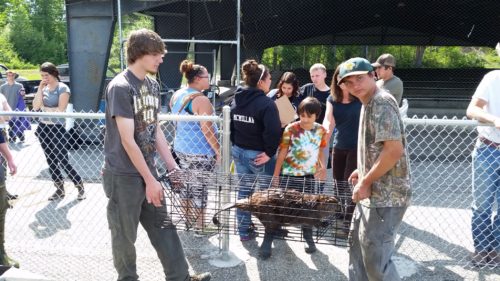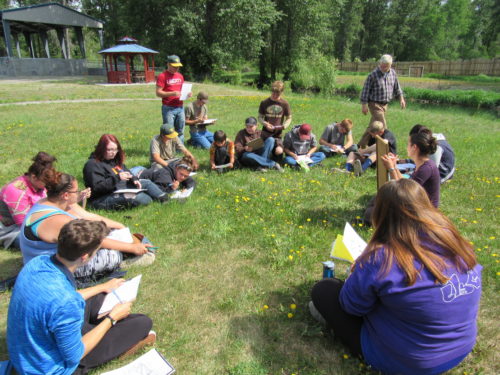Ecosystem Engineers: A beaver curriculum

By Hannah Newell, graduate student in the Institute’s 15th cohort.
A person’s perspective on the beaver is malleable. Some believe they are pests that need to be eradicated while others look deeply into their connection to the ecosystem and how they help shape our environment through their lifestyle.
Two North Cascades Institute Graduate students partnered with the Methow Beaver Project to create a curriculum to serve the Independent Learning Center in a few ways. One being the need for a biology class for their ninth to twelfth grade students and two, the desire to inform these students about the place that they live in and the beaver’s role in that place.
With four field trips planned over the course of four weeks, students were introduced to beavers at the Winthrop Hatchery, explored nearby wetlands to research macroinvertebrates and watershed development, and concluded their experience at the Twip Town hall where they conducted a mock town hall to view stakeholder opinions on the matter of the presence of beavers in the area.
Hannah Newell, one of the two graduate students who wrote the curriculum Ecosystem Engineers, reflected on the experience noting, “throughout the course of these field trips, you could see the perspective shift from the students.
At first, I noticed students face pull up in disgust when they first saw the beaver, but by the end of day one, some of them were wanting to continue the experience by becoming a volunteer with the Methow Beaver Project.”

Hands on learning experiences like these allow students to understand conservation on a realistic level. By going out into the field with wildlife biologists and getting to see a conservation movement in action and the passion behind the individuals working in the field, they can become inspired to follow a path they never thought existed previous to these experiences.
Kent Woodruff who spearheaded the collaborative work that is the curriculum Ecosystem Engineers expressed “It was interesting how mild the interest was at first, but they soon circled around to learn more. These are eager learners.”
At the culmination of the field trips, the students were asked to reflect on their experience. One student put the pieces together and stated, “we learned that beavers hold back water and actually clean the water making a better and healthier environment for all plants, animals, and people. We also learned that the more biodiversity you have in an ecosystem the healthier it is.”
The Ecosystem Engineer curriculum project allowed for three different Methow Valley stakeholders to come together and create an inspiring learning experience for youth in the area. The hope is that they become even further connected to their place in the valley and understand the dynamic functions of the ecosystem they reside within.
Thank you to the National Forest Foundation for supporting the development and implementation of the Ecosystem Engineer curriculum!

